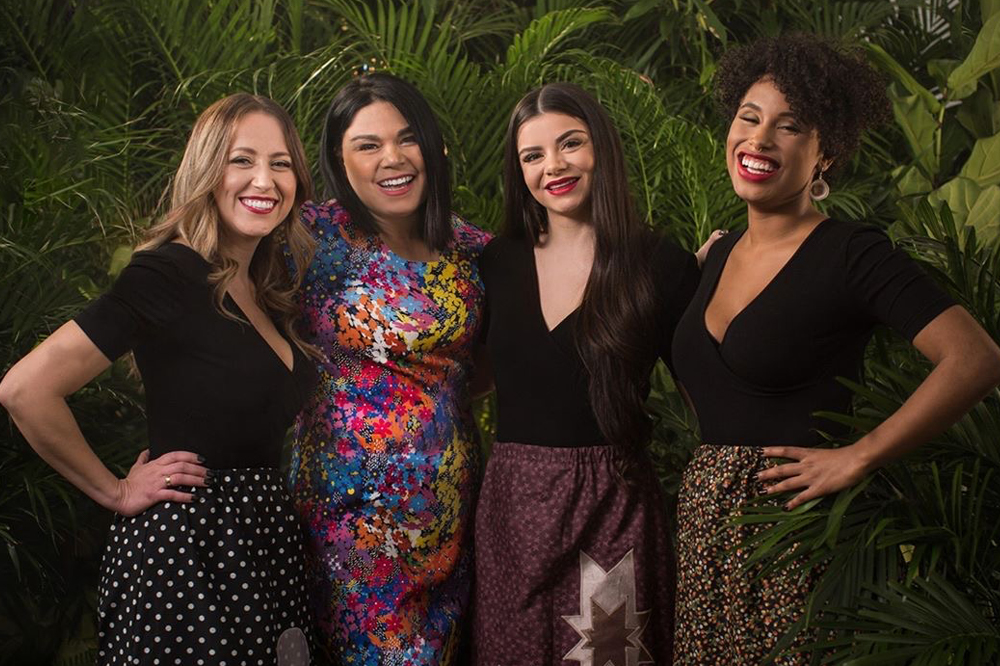For Jennifer Harper, owning her own cosmetic lab and line, Cheekbone Beauty, is a dream come true –literally.

“Back in 2015, I literally had a dream,” said the Anishinaabe-Canadian entrepreneur who now lives in St. Catharine’s, Ont. “It was about native little girls covered in lip gloss and they were extremely happy. And that night, I literally grabbed my laptop and started writing out the business plan.”
From no prior industry experience to CEO of a Canadian-made beauty brand (with a name she purposefully chose, to celebrate a facial feature Indigenous people are known for) — it’s all a reality Harper says she can hardly believe.
“Some days I sit there and I’m like, what? Who’s this? What’s happening here?” she told Global News, laughing incredulously.
It feels surreal, partly because of how much Harper has overcome to get here. Her journey has been shaped by past struggles with alcoholism and battles with her identity as a biracial woman — having a white mother and Indigenous father. Then there is the “constant companion of pain,” as she describes it, of losing her brother to suicide.
Harper, who grew up with her white mother, also had little familiarity with her Indigenous roots. When she learned later in life that her grandmother was a residential school survivor, she said that’s when her ‘aha’ moment came.

“If there is trauma, that does tend to go on for generations unless someone chooses to correct or heal it or begin the work to transform the trauma,” said Harper.
Recognizing the intergenerational trauma affecting her family and the long-lasting effects of colonial abuse on Indigenous communities in Canada made Harper want to break the cycle. She was empowered by the final words she heard from her brother before his death.
“He said something that really sticks with me to this day: that our youth need hope, and they need help.”
Harper evolved Cheekbone Beauty into a makeup company that is more than skin deep, with a mission for creating a space where Indigenous people can feel supported, celebrated and seen.
Her lipsticks are named after Indigenous women icons making waves in the beauty industry and beyond, like former Ms. Universe Ashley Callingbull and Canadian-American singer-songwriter Buffy Sainte-Marie.

Get daily National news
“Our original collection was called the Warrior Woman collection — it relaunches in October,” said Harper. “It was based on that whole concept of creating role models from within our community.”
And for every one of her makeup products sold, a portion of the proceeds goes back to organizations supporting Indigenous communities, their education and protecting their livelihoods, like the First Nations Child and Family Caring Society and other, land-based projects and initiatives that address the education funding gap.
“For us as a business, it’s about supporting Indigenous youth and sort of any idea of any education endeavour that they choose to go on,” said Harper.
“We gave back to provide solar power and clean drinking to a First Nation family last spring,” Harper said. “We (also) feel planting trees is really important to reducing our carbon footprint as a business and as a brand, so now I think we’ve planted 3,200 trees in North America.”
That focus on environment and sustainability isn’t by happenstance.
The indie brand has a goal of becoming zero-waste by 2023 and is well on its way, creating products made with ethically sourced, sustainable, plant-based ingredients, wrapped in packaging that is also compostable, biodegradable, plantable and reusable.
“So, from the beginning of harvest to the ingredients to the end of life of a product,” said Harper. “We do not want things to end up in a landfill and nor do we want anything that doesn’t biodegrade when it reaches the ecosystem.”
It’s not about just making a difference in the lives of Indigenous youth for Harper, but also protecting their future by protecting and preserving the environment.
“Indigenous people make up five percent of the world’s population but are protecting 80 per cent of the world’s biodiversity,” said Harper. “It is this innate connection with the land and (our) love and admiration for it…. They’re the oral teachings that have been passed down through history and learning there’s this innate responsibility to all of the things that creation has to provide — the land, water, air — and what we can do so that we’re not impacting those things negatively.”
Indigenous regalia-maker Deanne Hupfield, who is mentored by Harper, agrees with Harper’s sentiment.
“Historically, the way we lived on the land before colonization, the way we looked at the land and thought about it, it was built into the language. It was always about making sure there was enough for the people after us,” said Hupfield. “So I love that part of Jenn’s business.”
Hupfield, who has been an admirer of Harper since before her appearance on CBC’s Dragon’s Den, sees Cheekbone Beauty’s work as not only healing, but also motivating.
“She’s paving the way for us. No other Indigenous women are doing a business like hers, so at this time, its really great to see that,” said Hupfield.
“We’re all trying to build better lives after our terrible history in Canada, like residential schools and the ’60s Scoop and colonization. We’re trying to pick up the pieces, and seeing the work that Jenn is doing and how it is community-focused and she gives back … yeah, it’s Indigenous kinships where we support each other.”
For Harper, she says the feeling she gets when she learns of how her work is making a difference is hard to put into words.
“I can tell you that I feel it when I’m reading that email from a mom who adopted an Indigenous little girl, and she got our postcard and (she) went to bed with that postcard because that postcard had five models on it, all Indigenous, all from different parts of Indigenous communities. And she said, ‘They look like me.’
“To me, that’s where I think that speaks to the work that we’re doing. It’s a feeling, that’s hard to measure.”
Harper says she’s not naïve to think her company will be the silver bullet.
“We’re just a small brand, and we know that we’re not the solution to all of these big, huge problems that happen around us. But if we can be like a little glimmer of light in sort of a dark space, then we feel really good about the work that we’re doing.”

















Comments